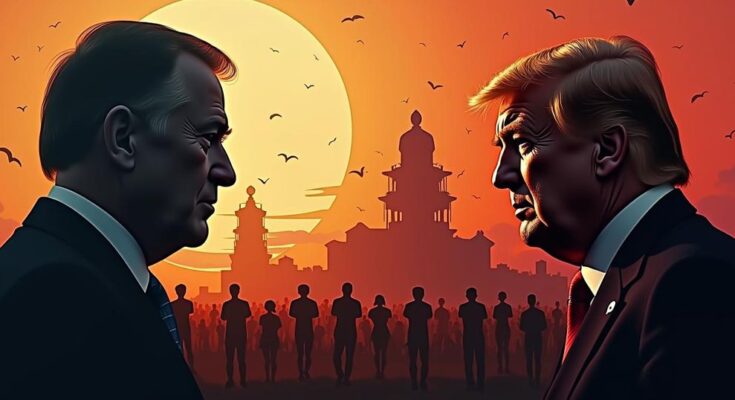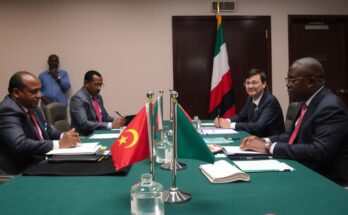The killing of Hezbollah leader Hassan Nasrallah represents a critical turning point in Middle Eastern politics, placing Iran in a difficult position as it considers its response to Israel. U.S. Secretary of State Antony Blinken highlights the importance of the upcoming days for regional stability. Iran must navigate between maintaining credibility and demonstrating military capability. Newly elected President Masoud Pezeshkian’s efforts to engage with the West are challenged by this escalation, while the U.S. faces a diplomatic embarrassment, struggling to exert control over its ally Israel amid shifting power dynamics in the region.
The recent assassination of Hassan Nasrallah, the leader of Hezbollah, heralds a pivotal moment for Iran and the broader Middle Eastern region. With the landscape irrevocably altered after 11 months of escalating tensions, the implications of Nasrallah’s death have prompted urgent deliberations in Tehran regarding its next steps. As articulated by U.S. Secretary of State Antony Blinken, the forthcoming days are critical for the future direction of the Middle East. Iran is now confronted with a daunting choice: it must navigate the delicate balance between maintaining its credibility on the international stage and asserting its military prowess in response to Israel’s actions. If Iran opts for an immediate and vehement condemnation of Israel, it risks undermining the credibility it has meticulously built within the region, particularly among its allies in the axis of resistance. Alternatively, should Iran choose to counsel Hezbollah to endure this significant loss and accept a ceasefire—potentially without specific terms for Gaza—it may prioritize pragmatism over provocation. Conversely, a direct military retaliation against Israel appears perilous, given Israel’s proven technological and intelligence advantages. Iranian officials understand that engagement with an adversary that has demonstrably infiltrated their operations poses significant risks. In this context, newly elected Iranian President Masoud Pezeshkian finds himself in an increasingly precarious situation. Pezeshkian’s recent diplomatic efforts at the United Nations, aimed at reviving the 2015 nuclear deal, could be jeopardized by the current hostilities. His foreign minister, Sayeed Abbas Araghchi, sought to build better relations with Western powers, yet he was met with disappointment as U.S. promises failed to materialize regarding a much-anticipated ceasefire agreement concerning Gaza. Iran’s Supreme Leader, Ayatollah Ali Khamenei, has called for solidarity with Hezbollah, urging Muslims to support their cause against Israel. This rhetoric signals Iran’s potential inclination towards confrontation. However, for the United States, this episode reflects a diplomatic debacle that underscores its diminishing influence within the region. The ability or willingness of Washington to govern its ally’s actions raises profound questions about U.S. authority and strategy in the Middle East. Prime Minister Netanyahu appears undeterred and believes he has outmaneuvered American diplomats. The U.S. has consistently pressed Israel to embrace alternative strategies and sought de-escalation, yet Netanyahu’s repeated deviations from agreements cast a shadow over their diplomatic relationship. This dynamic could leave the U.S. with limited avenues for action, particularly as Netanyahu enjoys a resurgence in domestic support and finds minimal opposition to his military strategies from Arab states in light of Nasrallah’s death. At present, it remains to be seen whether Iran will adopt a decisive approach in response to these developments. As events unfold, the strategic aim appears clear: while Netanyahu seeks total victory, the repercussions of Nasrallah’s assassination will shape regional alliances and influence the future of U.S.-Iran relations.
This article analyzes the geopolitical ramifications of the assassination of Hassan Nasrallah, leader of Hezbollah, which marks a significant escalation in tensions within the Middle East. The event challenges Iran’s leadership and its strategic choices regarding its response to Israel, along with its broader implications for its relationship with the United States. The backdrop of ongoing negotiations to revive the nuclear deal and the historical context of Iranian-Israeli relations provide a critical lens to understand the gravity of this incident. The evolving landscape of Middle Eastern politics, characterized by intense rivalries and shifting alliances, necessitates a closer examination of how Iran will navigate its foreign policy in the aftermath of this escalation. Secretary of State Antony Blinken’s remarks reflect the urgency of these developments as the United States grapples with waning influence in the region while supporting its ally, Israel.
In summary, the assassination of Hassan Nasrallah has created a critical juncture for both Iran and the United States, featuring a complex interplay of military strategy, regional politics, and diplomatic maneuvering. As Iran weighs its options—either pursuing retaliation or adopting a more restrained approach—it faces significant challenges in maintaining its credibility internally and externally. For the United States, this incident underscores a growing diplomatic humiliation, as its influence continues to wane amid an alliance that is proving increasingly difficult to manage. The actions taken by Iran in the coming days will be pivotal, determining not only the fate of Hezbollah but also the broader dynamics of power in the Middle East.
Original Source: www.theguardian.com




